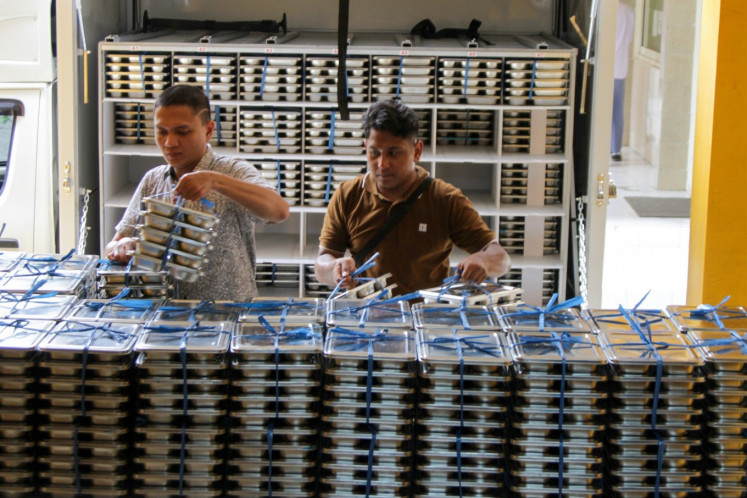Traders encouraged to utilize Maybank’s LCS framework
Trade facilities: Bank Indonesia financial market development head Nanang Hendarsah (left to right), Maybank Indonesia director of global banking Eri Budiono, Maybank Group’s chief economist Suhaimi Bin Ilias and Malaysian Trade Ministry counselor Naim Abdul Rahman pose for a photograph at the Indonesia-Malaysia bilateral trade meeting in Jakarta on Wednesday
Change text size
Gift Premium Articles
to Anyone

T
span class="caption">Trade facilities: Bank Indonesia financial market development head Nanang Hendarsah (left to right), Maybank Indonesia director of global banking Eri Budiono, Maybank Group’s chief economist Suhaimi Bin Ilias and Malaysian Trade Ministry counselor Naim Abdul Rahman pose for a photograph at the Indonesia-Malaysia bilateral trade meeting in Jakarta on Wednesday.(Antara/Audy Alwi)
The adoption of the Indonesia-Malaysia local currency settlement (LCS) framework by private lender Maybank Indonesia will help exporters and importers mitigate foreign exchange risks particularly under volatile conditions, a senior central bank official has said.
Bank Indonesia (BI)’s financial market development head Nanang Hendarsah encouraged exporters and importers to utilize the LCS framework.
“As an open economy, things that happen outside of Indonesia can directly affect the rupiah,” Nanang said. “One way to mitigate them is through foreign exchange hedging instruments, and the other is by using local currencies instead of the dollar for transactions.”
Maybank Indonesia is the first bank to facilitate transactions under the new LCS framework, allowing importers and exporters to save on foreign exchange costs.
BI, along with Malaysia’s central bank Bank Negara Malaysia (BNM) and Thailand’s central bank Bank of Thailand (BoT), launched the LCS frameworks in December, which allowed partner banks in these countries to carry out business transactions in rupiah, ringgit or baht beginning from Jan. 2.
Maybank Indonesia was among the six banks appointed by BI and BNM as the Appointed Cross Currency Dealers (ACCD) to support the operations of the rupiah-ringgit framework.
As an AACD, the bank offers the opening of ringgit current accounts, incoming and outgoing ringgit remittance, trade financing in ringgit and direct quotations on ringgit-rupiah spot market, forward or swap transactions.
Nirmala Salli, Maybank Indonesia’s head of transaction banking said on Wednesday the bank hoped the fee-based income from the new services could help Maybank Indonesia achieve its goal of 15 to 20 percent revenue growth this year.
Maybank Indonesia’s latest announcement put its gross operating revenue as of September 2017 at Rp 7.9 trillion (US$573.3 million), a year-on-year (yoy) increase of 5.2 percent from Rp 7.5 trillion in 2016.
“We don’t separate targets for fee-based or net interest income, but as a whole we always try to grow 15-20 percent from year to year,” she said.
Malaysia is one of Indonesia’s top ten trading partners, making up an average 6.4 percent of Indonesia’s imports and 5.5 percent of its exports between 2010 and 2016, said BI’s Nanang Hendarsah.
“The value of trade between Malaysia and Indonesia last year exceeded US$17 billion,” Malaysia External Trade Development Corporation (Matrade) trade commissioner, Naim Abdul Rahman, said.
“Only about 5 percent of that has been settled in local currencies, so there is still a very large potential for local currency settlement,” he said.
Naim added he hoped that the proportion of local currency settlement of Malaysia-Indonesia trade could double to at least 10 percent in the early stages of the framework.
“We hope that traders take advantage of this great opportunity to save on foreign exchange and transaction costs,” he said.
“We want to support the government’s goal of increasing the use of local currencies to further increase Indonesia’s high foreign currency reserves,” Nirmala said. (kmt)









